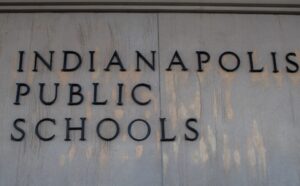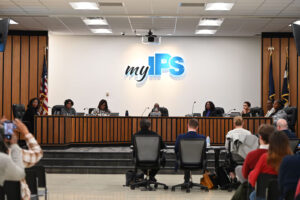I haven’t been shy about my disdain for the new-look Republican Party. Most of that is centered around the presidential career of Donald Trump, of course, whose remaking of that institution in his own image is nearing the end of its first full decade; and his recent actions have certainly done nothing to dissuade me of that disdain.
Their painfully-cringey attention-seeking M.O.—own the libs at all costs, ignore truth when it’s not politically expedient, wear your corruption on your sleeve and call it “making America great,” ignore the will of the electorate when your donors don’t like it—hasn’t ended in Washington DC. That particular MAGA plague has spread across the country, to varying levels of success. And in deep-red Indiana, which boasted a Republican supermajority in every branch of the government long before Trump descended that stupid escalator in 2015, the state GOP faithful have been playing the hits; again, to varying levels of success.
 In my home state of Indiana, this generally takes the form of the state taking aim at Indianapolis, the largest city and bluest dot in the state. In years past, it’s been attacks on our already anemic public transit and our already horrible pedestrian safety. But the latest expression of that MAGA M.O. against my city has been through a now-infamous bill designated HB 1136. The bill, innocuously named “School corporation reorganization,” is very intentionally targeted at the largest public school systems in Indiana by dissolving public schools in urban areas where charter schools are more successful. Since the GOP in Indiana (like in other states) has been diverting public funds from public education to charter schools for decades, driving public schools into crisis and forcing parents to choose charter and public schools if they want their children to have a meaningful education, this is essentially the legislative equivalent of the childish “stop hitting yourself” bullying technique.
In my home state of Indiana, this generally takes the form of the state taking aim at Indianapolis, the largest city and bluest dot in the state. In years past, it’s been attacks on our already anemic public transit and our already horrible pedestrian safety. But the latest expression of that MAGA M.O. against my city has been through a now-infamous bill designated HB 1136. The bill, innocuously named “School corporation reorganization,” is very intentionally targeted at the largest public school systems in Indiana by dissolving public schools in urban areas where charter schools are more successful. Since the GOP in Indiana (like in other states) has been diverting public funds from public education to charter schools for decades, driving public schools into crisis and forcing parents to choose charter and public schools if they want their children to have a meaningful education, this is essentially the legislative equivalent of the childish “stop hitting yourself” bullying technique.
Much has been written about the weakness of the charter school idea as currently implemented; about how for-profit charter schools are discriminatory in their admissions (some even calling them “modern-day segregation academies“), or about how they’re more likely to hire less-qualified educators, or prone to financial corruption and mismanagement of funds which can leave students without a school to attend when they go bankrupt. They also tend to reject special needs students, or expel underperforming students, or end up being run by would-be mobsters.
 Locally, the charter schools in Indianapolis have had a terrible track record. More than once per year since 2001, Indianapolis has seen charter schools close for poor performance, for cheating on standardized tests, for using public funds on political campaigns, and for literally just…disappearing. Statistically almost a third of Indianapolis charter schools fail, but some of the ones that stick around employ draconian discipline for the most minor of infractions, and more than half of them perform significantly worse than their public school counterparts.
Locally, the charter schools in Indianapolis have had a terrible track record. More than once per year since 2001, Indianapolis has seen charter schools close for poor performance, for cheating on standardized tests, for using public funds on political campaigns, and for literally just…disappearing. Statistically almost a third of Indianapolis charter schools fail, but some of the ones that stick around employ draconian discipline for the most minor of infractions, and more than half of them perform significantly worse than their public school counterparts.
 Despite all of this, Indiana State Representative Jake Teshka (who, it must be noted, represents no school districts who would be affected by his bill) proposed HB 1136 in early January, which would transfer control of the schools in five Indiana school districts to charter schools. One of those districts, Indianapolis Public Schools, is where my children are enrolled. We love our school, and almost all of the parents I know do, too.
Despite all of this, Indiana State Representative Jake Teshka (who, it must be noted, represents no school districts who would be affected by his bill) proposed HB 1136 in early January, which would transfer control of the schools in five Indiana school districts to charter schools. One of those districts, Indianapolis Public Schools, is where my children are enrolled. We love our school, and almost all of the parents I know do, too.
Naturally, public outcry ensued. After IPS sent an email to parents about the proposed change (and the district’s fate under it), a parents’ advocacy group spun up essentially overnight, speaking in hearings at the State House and motivating other parents to act. The bill received a flurry of local press attention. And in our current political climate, you would be forgiven for expecting such action to do effectively nothing; after all, in Washington, they don’t. Honestly, in Indiana, they often don’t.
But this time, they did. Seemingly as a result of the overwhelming public outcry, the Indiana House Education Committee has declined to entertain the bill any further. HB 1136 is dead.
And it’s not dead because of something Democrats did (they hold less than a third of the seats on the Education Committee), though their voices in support of IPS and in opposition of the bill have been welcome. It’s dead because citizens made enough noise about it. At the risk of sounding maudlin, we did it. And that gives me a lot of hope about the future.
 Now, is there a chance that its language will make it into other bills before the legislative session is over? Are there other bills that threaten my children’s beloved school, in one way or another? Is Governor Braun’s tax plan still threatening to pull funding away from a public education system that’s already severely underfunded? Are Republicans still trying to exert their control over the city of Indianapolis? Is there a possibility that HB 1136 was never intended to pass as-written in the first place, or that it was proposed as a way to sneak a less-awful but still-bad bill across the finish line?
Now, is there a chance that its language will make it into other bills before the legislative session is over? Are there other bills that threaten my children’s beloved school, in one way or another? Is Governor Braun’s tax plan still threatening to pull funding away from a public education system that’s already severely underfunded? Are Republicans still trying to exert their control over the city of Indianapolis? Is there a possibility that HB 1136 was never intended to pass as-written in the first place, or that it was proposed as a way to sneak a less-awful but still-bad bill across the finish line?
Yes, to all of those things. But for now, HB 1136 is dead. It’s dead because we stood up to it. And in this world made bleak by a Republican party whose tactics I don’t recognize (or at least didn’t before 2015), that’s brought me a little bit of hope this morning.


